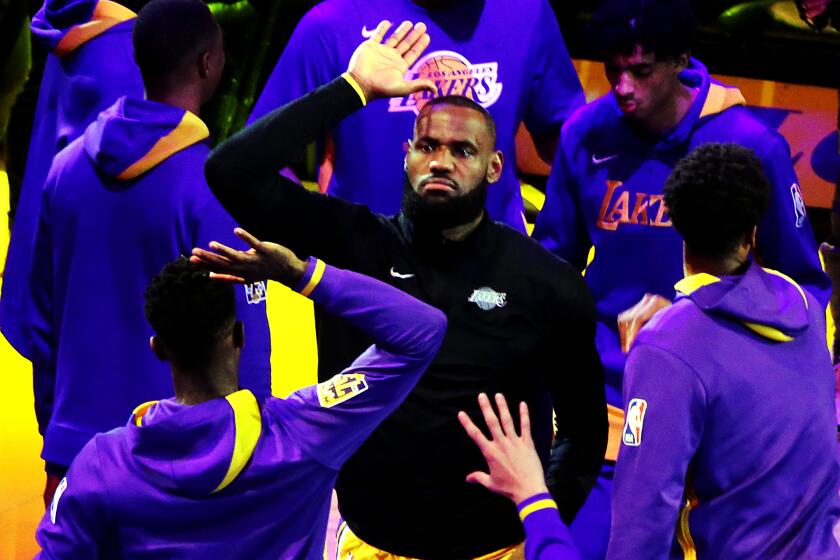A Return to the Light : ‘I Was for So Long in Such a Dark Place,’ Monica Seles Says of Her 2 1/2-Year Struggle to Escape Stabbing Trauma
Bright summer afternoon sunlight was streaming into Monica Seles’ hotel suite, glinting off a cut-glass vase holding a spray of fresh flowers. The spacious room held the usual athletic clutter of socks, rackets, crumpled towels, a massage table and, in Seles’ case, two tiny biscuits for her dog, Astro, on a marble side table.
Seles was miles from the sticky heat and hubbub of the du Maurier Ltd. Canadian Open, where earlier in the day she had played and won her second professional tennis match in 28 months. Now, relaxing on a sofa while rubbing ice on her left knee, Seles was haltingly describing her 2 1/2 years of exile from tennis, as a result of a knife wound between her shoulder blades and deeper wounds to her then-19-year-old psyche.
Public outrage followed the attack on Seles during a tournament in Hamburg, Germany, on April 30, 1993. Curiosity has marked her absence. Now, with her return, comes a warm greeting and overwhelming good will. Tennis fans seem genuinely moved by Seles’ comeback.
One example came during Wednesday afternoon’s match at the National Tennis Centre at York University. Seles was serving against Nathalie Tauziat, the match score displayed on the huge scoreboard that could be seen from the adjacent busy street. As Seles tossed the ball to serve, wafting up from the street behind the grandstand came the sound of a car horn and a shouted, “Go, Monica!”
Seles gathers such random acts of kindness and uses them to bolster her in the face of a world that--even as it had been revealed to her as cruel--Seles has concluded is worth rejoining.
“I had a lot of emotions,” Seles said, remembering the time after Guenter Parche stabbed her during a changeover. “When I stepped on the court, that’s when I’d get angry. Tennis never did anything bad to me. The tennis court was my place. Anything that was happening in my private life, I could forget about it and think of the ball. I felt the safest there. All my worries were gone. I didn’t have to think about anything when I was there. Suddenly, that was taken away.
“I’d just cry, cry, cry. I would go to a restaurant and if anyone would just say anything, it would be awful. This lady came up to me one time and said, ‘We hope you can come back, we miss you.’ I started crying and went into the bathroom. She followed me, she was upset, she said, ‘I’m so sorry that I said anything.’ I would get so emotional, I couldn’t talk about it for such a long time.
“I was for so long in such a dark place. So unhappy. I thought after [the stabbing] there was no way up, I didn’t know how to go up. I felt I was in a deep hole and getting deeper. My dad told me, ‘Maybe you need professional help.’ I had a very hard time talking about it. I couldn’t keep from crying. But I felt I was doing the right thing because I was going deeper and deeper, down and down. I didn’t know how to get out. I didn’t think there was a way out. If I hadn’t have done that, gone to a psychologist, it would have been bye-bye, Monica.”
Seles began working with psychologist Jerry Russel May in Reno in July 1993, even as her former peers were at Wimbledon and Parche remained free. May treated Seles for post-traumatic-stress syndrome, even as Parche twice was tried and twice found guilty of assault, yet twice set free.
Oddly, Seles never intended to enter the Hamburg tournament. But because she had contracted a virus and missed some playing time, she entered at the last minute, as a preparation for the French Open. Seles was playing well, until Parche left the stands and attacked her in front of 7,000 horrified spectators because he wanted Seles out of the way so Steffi Graf, with whom he was obsessed, would regain the world No. 1 ranking.
“Tennis was such a big part of the day-to-day going into Hamburg,” Seles said. “Then one day I wake up in the hospital and it’s all gone. I’m thinking, ‘Am I now supposed to be happy?’ I thought that maybe I was supposed to suffer. Things had always happened to me. But this thing was so out of line. All I wanted to do was play tennis.
“The truth is, I never felt anger toward him [Parche] or anybody. I don’t feel anything toward him. First, I was a 19-year-old girl sitting in a chair. He put something in [my back]--a kitchen knife that he said he cut sausages with. Takes it out, goes again and says all these awful things afterward. He is let go. To me, that is very hard. Two times they confirmed that he attacked me. He hurt another human being.
“Everything he wanted, he got. I never got anything. Justice is not existing. He got Steffi to be No. 1. To this day he doesn’t even have to check in with a parole officer. He can go anywhere, he can be anywhere.”
Before the attack, Seles had just about wended her way through the emotional maze of having won her first Grand Slam event at age 17, becoming No. 1 in the world and reconciling herself to what kind of a life that meant for her. Winning the 1993 Australian Open, her seventh title in eight Grand Slam events, Seles had finally found peace at the top.
“I wondered why I was never happy, even when I won,” Seles said, giggling at the incongruity. “I had to sit down with myself and figure it out. I had put too much pressure on myself, [I was] too hyper-critical and too full of self-doubt. For the first time, after Australia, I was beginning to say, ‘I’m No. 1, fine. If I can do well, fine.’ Then, after I was stabbed, I was back to zero.
“I went through all that doubt again. After many, many months, I thought, ‘This is not how I want to be at age 19 or 20.’ Step by step I found my balance. I talked a lot to victims of stabbings. It violates, when someone puts in an object. . . . Every time you look back, you have a scar.
“You have to admit pain or that you have a problem with something. It’s part of any recovery. First you have to admit you aren’t a rock, then you wouldn’t be a human being. If you have no emotions and no feelings, you are a robot.
“This was total darkness and sadness and so many emotions I never had to deal with before. In tennis, if I say I’m going to hit a ball cross court, chances are, 90% of the time, it’s going to go where I say. For me to feel uncertainty, fear, everything, was terrible.”
In the midst of her struggle, life twisted on Seles again. In a span of months, her father developed prostate cancer and then stomach cancer. The illness of Karolj Seles, a gregarious former cartoonist, was at once crushing to Monica but also redeeming.
By getting out of the dark hole, Seles was able to see that everyone lives with some measure of darkness.
Seles begins to lean forward, gesturing with her hands, her eyes shining.
“When my dad was sick in the hospital, I spent time with the kids there. I was thinking about how life was not fair,” Seles said, smiling. “I was thinking of myself and my father. You see these children, dealing with cancer since the age of 7. They run and play. They are happy for each day.
“I work with Special Olympics kids. To see that child so happy, so joyous to get a medal for fifth place, happy just to finish the race. And I think how I was unhappy after winning a Grand Slam. If I could be like that, grateful for the joy. That’s where I want to get back to. To find that again.”
The light outside the window has faded but its brightness remains in the room, captured in the crucible of Seles’ hope. She’s ready to rejoin life.
More to Read
Get our high school sports newsletter
Prep Rally is devoted to the SoCal high school sports experience, bringing you scores, stories and a behind-the-scenes look at what makes prep sports so popular.
You may occasionally receive promotional content from the Los Angeles Times.







